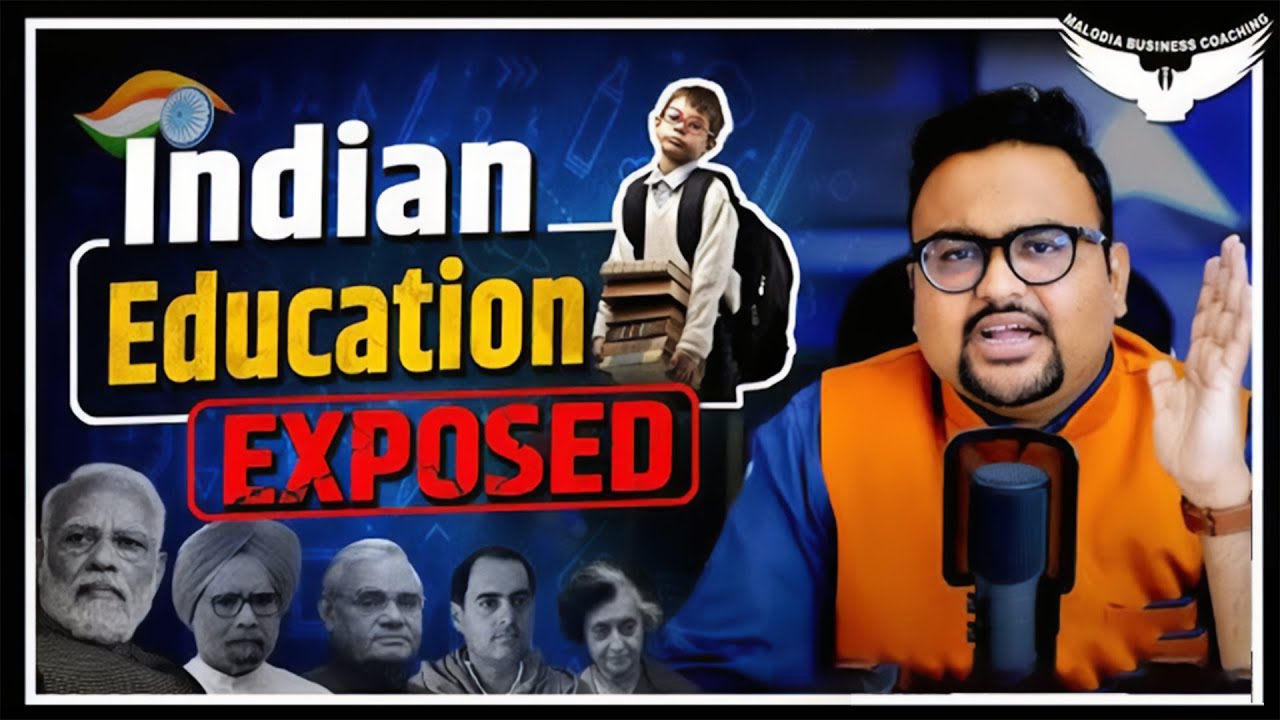Shocking Truth about Indian Education!
Summary
TLDRThe speaker critiques the Indian education system for prioritizing rote learning over practical skills and emotional intelligence. They emphasize the pressure parents place on children to achieve high grades and the relevance of knowledge in a rapidly changing world driven by technology. The discussion highlights the need for a holistic approach to education that fosters interpersonal skills and adaptability rather than merely preparing students for exams. By encouraging children to explore their passions and develop life skills, parents can better prepare them for an unpredictable future, creating well-rounded individuals capable of navigating the complexities of modern life.
Takeaways
- 😀 The Indian education system is heavily focused on rote learning, which may not be useful in real life.
- 😀 Parents place immense pressure on children to achieve high grades and excel in entrance exams for college admissions.
- 😀 The current system often leads to mental health issues, including suicides among students due to academic stress.
- 😀 Knowledge and skills gained in school may become obsolete due to the rapid evolution of technology, especially AI.
- 😀 Language barriers are diminishing with advancements in translation technology, making communication more accessible.
- 😀 Degrees have become status symbols rather than indicators of true capability or interest in a field.
- 😀 Many graduates lack direction and are unaware of their true interests and career paths.
- 😀 The previous Gurukul system provided practical knowledge and skills relevant to life, which is lacking in modern education.
- 😀 Essential life skills, such as financial literacy and interpersonal skills, are not adequately taught in schools.
- 😀 Parents should avoid pressuring children and allow them to explore their interests freely for a happier, more fulfilling life.
Q & A
What is the main concern of parents regarding their children's education?
-Parents are primarily worried about their children achieving good grades, excelling in entrance exams, and securing jobs, which puts immense pressure on students.
How does the speaker describe the current Indian education system?
-The speaker characterizes the Indian education system as a 'rote learning machine' that prioritizes theoretical knowledge over practical skills, failing to prepare students for real-life challenges.
What impact does the pressure for high grades have on students?
-The pressure for high academic performance can lead to mental health issues, including stress and anxiety, and in severe cases, it can result in tragic outcomes like suicide.
How does the speaker view the relevance of information in today's world?
-The speaker argues that in the age of AI, information is becoming more accessible and free, diminishing the value of rote knowledge acquired through traditional education.
What does the speaker suggest about language barriers in education?
-The speaker notes that language barriers are decreasing due to technology, which enables real-time translation and communication, allowing students to access knowledge without being limited by language.
What skills does the speaker emphasize as important for children's development?
-The speaker emphasizes the importance of interpersonal skills, emotional intelligence, stress management, and practical problem-solving abilities over traditional academic achievements.
What was the historical approach to education mentioned in the transcript?
-The speaker references the Gurukul system, which taught practical life skills, philosophy, and physical education, providing a more well-rounded education compared to the current focus on exams and grades.
What alternatives does the speaker propose for modern education?
-The speaker advocates for a more holistic education approach that includes emotional and social skills, financial literacy, and practical knowledge that will be useful in the future.
How does the speaker perceive the future of job markets concerning degrees?
-The speaker expresses concern that degrees have become mere status symbols rather than indicators of capability, with many graduates unsure of their career paths despite having formal education.
What advice does the speaker give to parents regarding their children's education?
-Parents are advised not to pressure their children for grades but instead allow them to explore their interests and develop skills that are relevant in a rapidly changing world.
Outlines

Cette section est réservée aux utilisateurs payants. Améliorez votre compte pour accéder à cette section.
Améliorer maintenantMindmap

Cette section est réservée aux utilisateurs payants. Améliorez votre compte pour accéder à cette section.
Améliorer maintenantKeywords

Cette section est réservée aux utilisateurs payants. Améliorez votre compte pour accéder à cette section.
Améliorer maintenantHighlights

Cette section est réservée aux utilisateurs payants. Améliorez votre compte pour accéder à cette section.
Améliorer maintenantTranscripts

Cette section est réservée aux utilisateurs payants. Améliorez votre compte pour accéder à cette section.
Améliorer maintenantVoir Plus de Vidéos Connexes

The Fall of The Education System (Why De-Centralisation Works)

5 Hal ini Wajib BELAJAR SEKARANG

THE ARMY OF SATAN - PART 19 - Education System Exposed - Modern Slavery

Indian Education System Exposed By Rahul Malodia

How Indian Education System Fooled You

BY PASS THE EDUCATION SYSTEM BY SANDEEP MAHESHWARI SIR
5.0 / 5 (0 votes)
